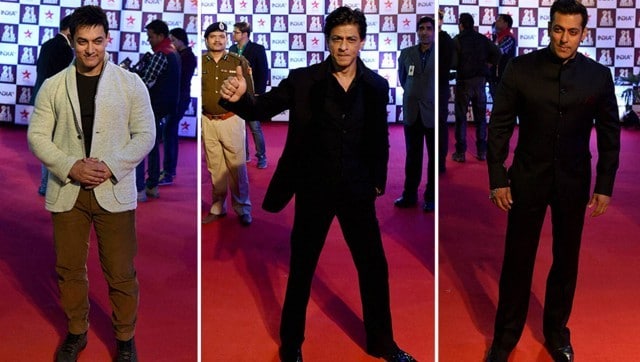The uniquely skewed economics of Indian cinema had created the form of stardom that depended solely on extravagant advertising and marketing and management over demand and provide to gloss over drained scripts, dangerous appearing, and forgettable route

From Left to Proper, Amir Khan, Shah Rukh Khan, Salman Khan
What number of occasions have you ever mentioned or heard others discussing Shah Rukh Khan, Aamir Khan, Salman Khan, Akshay Kumar, Ajay Devgn, Ranveer Singh or Ranbir Kapoor these days? Extra importantly, what number of occasions have you ever missed them since they went off the glamour billboards and the large, invasive publicity machine that surrounds us?
Likelihood is, you haven’t.
COVID has killed the famous person. The uniquely skewed economics of Indian cinema had created the form of stardom that depended solely on extravagant advertising and marketing and management over demand and provide to gloss over drained scripts, dangerous appearing, and forgettable route.
Solely the massive homes and filmy cartels may afford huge advertising and marketing budgets and a stranglehold over distribution and screening. High male stars walked away with greater than half the cash spent on producing the complete film, with their price going as much as Rs 80 crore and past. The smaller funds movies, which regularly relied on higher scripts and performances, couldn’t match even a fraction of that advertising and marketing spend and attain.
This economics allowed the famous person to grossly over-earn and underperform. That comfortable time could also be over.
COVID-19 and the spate of lockdowns have biologically bombed that economics. Theatres are shut for months. Baroque promotions with occasions, excursions, and mall and media visits can’t occur due to social distancing. And digital OTT platforms have levelled the enjoying floor.
and the spate of lockdowns have biologically bombed that economics. Theatres are shut for months. Baroque promotions with occasions, excursions, and mall and media visits can’t occur due to social distancing. And digital OTT platforms have levelled the enjoying floor.
Of the hallowed lot, solely Salman Khan dared to launch his ‘Radhe’ on OTT. These platforms don’t reveal their figures, however from most accounts, the movie didn’t go away a mark.
There are a number of explanation why the massive hero and the massive director don’t dare placing their work on a digital platform.
First, they can’t muscle the smaller gamers out of an OTT platform by monopolising distribution. The patron doesn’t should push down what the multiplexes and single display drive on them. She or he can train their selection on which content material to observe.
Second, the massive, bodily advertising and marketing promotions are off the desk, for now. Once more, super-productions can’t bully the small fish out of the water.
Third, audiences behave in a specific method once they watch a film in a mob, willingly partake within the shallow, mass fantasy ritual. When they’re watching the identical film alone or with household or shut pals — on TV, laptop computer or cellular screens — they have a tendency to behave extra rationally, selecting deeper, higher content material over it.
Fourth, complacent of their billion-dollar cocoons, most massive stars and administrators haven’t upped their sport. Not like a Leonardo DiCaprio, Kate Winslet, Tom Hanks or Kevin Spacey who can straddle each well-liked performances and extremely angular roles with equal elan, our mainstream deities are caught in their very own caricatures.
COVID will wane in the future. Theatres will open. However will the famous person return with the identical swag and undeserving audacity?
Unlikely.
Digital OTT platforms are right here to remain. With growing smartphone and laptop penetration in India’s remotest elements, filmmakers and content material creators with smaller budgets and brighter concepts will take away a serious slice of theatre audiences. Animation, particular results and rising digital actuality and different applied sciences will minimise time on the units and usher ‘digital manufacturing’.
As an alternative of the eight-week hole between massive display and digital premiere of movies, Bollywood might be compelled to launch on a streaming platform inside two or three weeks of its theatrical opening. This can significantly blunt the bullying by distributors and exhibitors.
At present, these lengthy relegated to the center benches as ‘character actors’ — Manoj Bajpayee, Nawazuddin Siddiqui, Pratik Gandhi, Radhika Apte, Jaideep Ahlawat, Rasika Dugal and others —are family names. They’ve damaged into the galaxy of stars due to sheer expertise.
Within the post-COVID, more and more digital world of cinema and leisure, it’s the Khans, Chopras, Johars and Kapoors who have to catch up, measure up, if they’re to remain within the strobe mild of public reminiscence.




